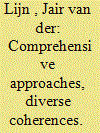| Srl | Item |
| 1 |
ID:
139097


|
|
|
|
|
| Summary/Abstract |
Since 2000, international organisations such as the UN, NATO and the EU, but also countries, have started to apply what has been called the comprehensive approach to crisis management. This article unpacks this comprehensive approach implemented by the Dutch in Uruzgan province, Afghanistan. It first borrows and expands a conceptual framework developed by De Coning and Friis. Subsequently, it maps the different sorts of coherence in the mission by applying the framework. It shows how in practice there was not one single comprehensive approach, but many different forms of interaction between a number of organisational units. Each interaction had its own distinct issues and its own level of coherence. The level of coherence differed depending on the level at which the interaction took place – strategic at headquarters level versus operational at field level – and at what point in the mission it happened – in most cases it moved towards more cohesion.
|
|
|
|
|
|
|
|
|
|
|
|
|
|
|
|
| 2 |
ID:
170463


|
|
|
|
|
| Summary/Abstract |
NATO’s crisis management engagement came of age in the Kosovo crisis of 1999, as the alliance committed fully to this role in its 1999 Strategic Concept and consequently inscribed the engagement in the Euro-Atlantic security architecture it sought to refine in subsequent years. The war in Afghanistan brought change as NATO at first sought to implement its crisis management principles and then, when it ran into policy failure, accepted the Americanization of its strategy and ultimately sought to reformulate its principles in more modest terms. Where Kosovo lessons were initially seen in European security management terms, their subsequent limitations on the wider global stage impacted NATO’s broader transformation for twenty-first-century security and defense operations. NATO is today still coming to terms with the experience.
|
|
|
|
|
|
|
|
|
|
|
|
|
|
|
|
| 3 |
ID:
142986


|
|
|
|
|
| Summary/Abstract |
EU-Japan cooperation on issues related to security includes efforts for eradicating terrorism, coordinating policy, and working together in crisis management operations. The EU and Japan share the same values and are societies based on democracy and the rule of law, and they have similar approaches to regional and global peace and stability. In 2015 the three focus areas are EU-Japan cooperation for global peace and stability, cooperation for contributing to addressing global challenges, and the promotion of the strategic partnership. This article suggests that bilateral cooperation between the EU and Japan will encourage multilateral commitment for global cooperation to resolve global problems.
|
|
|
|
|
|
|
|
|
|
|
|
|
|
|
|
| 4 |
ID:
131102


|
|
|
|
|
| Publication |
2014.
|
| Summary/Abstract |
The increasing privatization of military and stability operations has received considerable scholarly attention. Existing scholarship, however, has largely focused on the privatization of state foreign policy, overlooking the empirical analysis of international organizations' use of commercial actors in the conduct of crisis management operations. The present study fills this gap by investigating the role of commercial contractors in supporting European Common Security and Defence civilian and military missions. By doing so, the article intends to advance the empirical knowledge of the privatization of foreign policy activities and the scope, determinants and future prospects of EU reliance on commercial actors for CSDP crisis management operations.
|
|
|
|
|
|
|
|
|
|
|
|
|
|
|
|